Six years ago, as Dan Kwan and Daniel Scheinert were sketching out ideas for Everything Everywhere All at Once, their interdimensional martial arts fantasy about a frazzled mother battling a series of increasingly comical and cosmic challenges, the writer-directors found themselves facing their own Nietzschean problems. Along with personal and career anxieties and undiagnosed struggles, there was a basic quandary about the story they wanted to tell: Could a movie set in the absurd chaos of infinite universes have any meaning? Which is to say, did anything they had to write really matter?
“We kept talking about this,” Kwan recalled over Zoom recently, “and Scheinert was like, the thing that’s really frustrating about the multiverse is, who cares once you introduce infinity, and every single possibility exists?”
Scheinert and Kwan, both 34 and known collectively as “Daniels,” ask a lot of questions, like scientists testing the limits of some terrain; and it could be said that they’ve built their decade-long, internet-borne career out of a cascading series of unlikely questions. In 2016, after directing wacky, outrageous music videos for the likes of The Shins and Foster the People, they had moved on to helm their first feature, Swiss Army Man, a surrealist saga about depression starring Daniel (Radcliffe) as a flatulent corpse. The film was a critical (and, to some extent, commercial) success, earning them the latitude to go bigger.
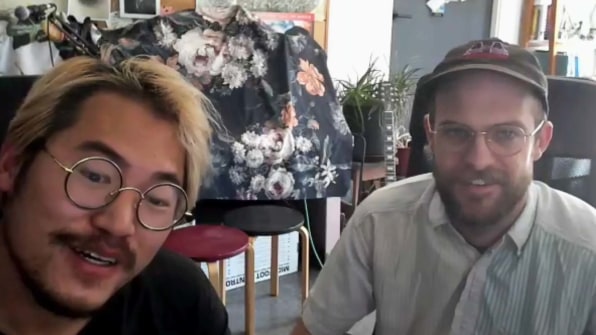
As they began kicking around ideas, the duo grew fixated on something big enough: the idea of alternate universes, an ancient concept that’s been revived by philosophers, physicists, and cosmologists. They had even played with the idea years ago, in a 2014 interactive short that explored the possibilities of a breakup; and the more they thought about it, the more it seemed like a perfect way to combine their maximalist, genre-hopping style with their love of science and sci-fi.
“We specifically love science fiction that has a sense of humor and also goes to philosophical extremes,” said Scheinert. (They cite Douglas Adams and Kurt Vonnegut alongside The Matrix and Fight Club.) There were a lot of ideas they wanted to explore, too: mental health, attention, the immigrant experience, lives not lived, information overload, the gaps between family members and generations, the quandaries of the internet and of the universe. “And butthole humor,” said Scheinert. (More on that later.)
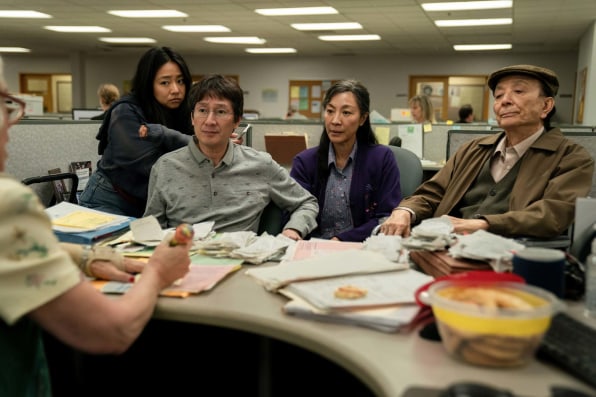
But the multiverse also looked like treacherous territory. The idea was already starting to become a staple of a parade of contemporary sci-fi and fantasy stories. And often, they thought, it came across as complicated and nonsensical and emotionally-deadening—like a new way for tortured scriptwriters to tee up visual sequences and sequels, rather than, say, to explore interesting ideas or genuine feelings.
“I don’t care about multiverse movies,” Kwan said. “Once the multiverse is introduced, nothing matters—there is no choice, and a character’s nothing without his choices. So everything’s watered down. There’s like, five Spider-Men now? Why?” It was 2018’s Into the Spider-Verse that thrust the idea into the mainstream. “No knock on Marvel—it’s just that the multiverse theory goes in that direction.” (Even as the two tried to escape the shadow of that other superhero universe, it would still loom over Everything. Anthony Russo and Joseph Russo, the fraternal directors of Avengers: Infinity War and other Marvel blockbusters, signed on as the producers behind Everything’s large-for-Daniels-but-still-relatively-tiny $25 million budget. And as they began shooting, the two were approached to make Marvel’s Loki, another multiverse-spanning saga, but opted to pass.)
As they began outlining their multiverse movie, the two kept getting stuck on the Multiverse Movie Problem. “It got really frustrating,” Scheinert recalled. And then it hit them. “What if we made a multiverse movie that went so far into the idea of an infinite number of universes that it went to the conclusion of, well, nothing matters?” Then from there, said Kwan, they wondered, “Can we as filmmakers, pull them back, and give them a hug?”
The result is not really a multiverse movie, or any certain kind of movie, because it explodes genre altogether. What looks at once like a real-life anime on acid is also mesmerizing and gut-wrenchingly hilarious and far more affecting than anyone might expect from any kind of movie. It’s already a hit, too, breaking records for an A24-distributed film before its nationwide release this week, and earning rave reviews; on the crowdsourced review website Letterboxd, it has a 4.6, making it the site’s highest-rated movie.
Choosing to pay close attention to that Multiverse Movie Problem, “I think is what saved us,” said Kwan. In a universe of too many multiverse movies, he remembered thinking, “This is gonna be something that no one else will want to do. Because it’s impossible.”
Universes collide
Everything starts in a familiar kind of universe, where Michelle Yeoh is Evelyn, a Chinese American laundromat owner trying to cope with a looming tax audit. But as Lunar New Year approaches, there’s trouble brewing: her husband (Ke Huy Quan, of The Goonies and Indiana Jones And The Temple Of Doom) has grown distant, her wayward teenage daughter (Stephanie Hsu) is spending more time with her new girlfriend, and her elderly father (played by James Hong, of, among other things, Big Trouble in Little China) has just arrived from China. And the tax audit (conducted by a creepier-than-ever Jamie Lee Curtis) is drowning her in receipts and threatening to end her business.
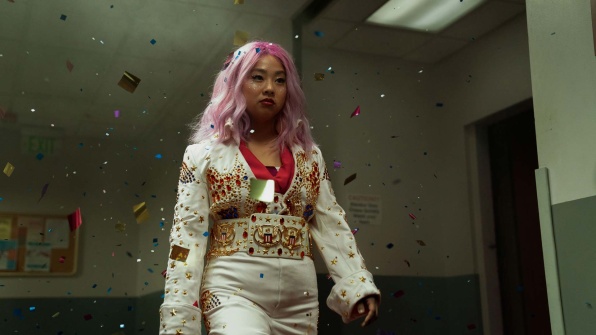
But suddenly, universes collide, and an alternate-universe version of her husband arrives to inform Evelyn that now the future of the multiverse, too, depends on her. To tap into their own superhero-like versions of themselves, she and other characters must do increasingly absurd things, like eat chapstick and stick pointy things in their butts. And soon, we are sliding into kaleidoscopic worlds where people have hotdog fingers or Jenny Slate wields a chihuahua like a mace, or a universe under threat from a black hole that is actually the center of a gigantic Everything bagel (everything defined literally here). Covered in hopes and dreams and “every last personal ad on Craigslist,” the bagel becomes “the truth,” explains Jobu Tabacky, a bizarro, omnipotent version of Evelyn’s daughter, and the truth is that “nothing matters.”
It’s impossible to explain much of this, though it’s still not as convoluted as whatever is happening in Tenet. But amid all the chaos and anomie and stupidity and infinity of the multiverse, we follow Evelyn to a liberating realization: Even a seemingly meaningless world still has meaning . . . because we humans create it. We make meaning in the ways we treat ourselves and others, and even the tiniest decisions can fork our timelines in consequential directions.
To describe all of this, Daniels would have to go on their own confounding journey. “We were biting off a question we don’t know the answer to,” Scheinert said. “And then we were like, Ooh, let’s work on that for a few years because I’m pretty sure I won’t get bored, because I’ve got something kind of scary to chew on.”
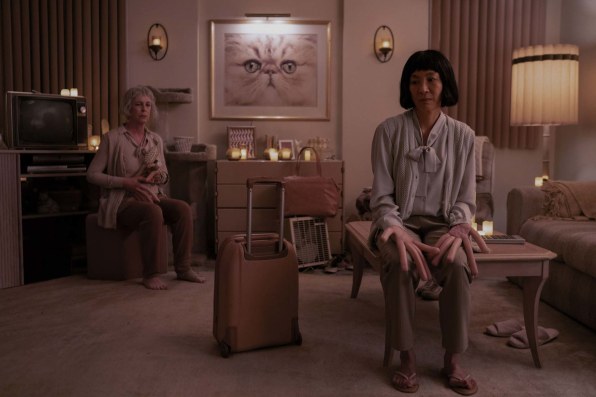
The two Daniels first met fifteen years ago in an animation class at Emerson College, but they didn’t start experimenting together until after graduation while both were teaching at a filmmaking summer camp, and Kwan got a new Canon 5D Mark II. “We started making silly, stupid internet videos—this was 2010, so YouTube was just happening, Vimeo was just starting to really become a thing,” he said. “And we actually stumbled upon this weird, beautiful alchemy mostly because you know, [Scheinert] was a big fan of Tim and Eric and that kind of stuff. And I have good taste.”
“He watches more reality TV than I do,” Scheinert fired back.
Their wild work won them billions of views and MTV awards and wide internet acclaim, but as they “chased the likes,” existential anxieties crept in, Kwan said. “As we worked on that kind of stuff, we’d feel really dirty inside because it just meant nothing. We realized, if I’m gonna be spending my life doing this, I want it to mean something.” They began refining their characters and their emotions, colliding them at high speed with their most outlandish ideas. “We just tried to see what would happen if we just slammed those two things together: The more stupid it was, the more sentimental and earnest we could push it, just to see what would happen.”
Everything is a tour de force of slamming-together. As the characters toggle between languages (Mandarin, English, Cantonese) and then different versions of themselves, with the camera swiveling and zooming and a near-constantly pulsating soundtrack (Son Lux did the score, with contributions from Mitski, David Byrne, André 3000, Randy Newman, and others), the movie captures the uncanny delirium of digital life, of doomscrolling and context-collapsing and switching between realities, and the strange effect all this has on our relationships. Online, as in the multiverse, you can see things and perspectives you never knew existed; or you can live in whatever world you please, all others be damned. The characters of Everything don’t mention the internet, but it looms over everything.
“Specifically for us: we are millennials, we grew up on the internet, we were the first generation to do so, and our parents didn’t,” said Kwan. “And so I think that made that gap just a chasm. And so the movie uses the multiverse almost as a metaphor for how the internet has destroyed our minds. And how our parents are trying to figure out how to fix this.”
Amid the pandemonium, it is Evelyn’s struggle—to keep it all together, to reach her distant daughter and her weary husband, in spite of decades of quiet trauma and regret and impossible expectations—that forms the movie’s emotional core.
“The goal was to create a relationship that was so nuanced and so specific that it wouldn’t get washed out by this movie because this movie is big and loud and chaotic,” said Kwan. “It’s like the search for a theory of everything: How do we reconcile quantum physics, the science of the smallest, and classical physics, the physics of the cosmos? How can we make one theory comprise those two things? And this movie is like, how can we take the smallest relationship and make it just as powerful as the existence of every multiverse?”
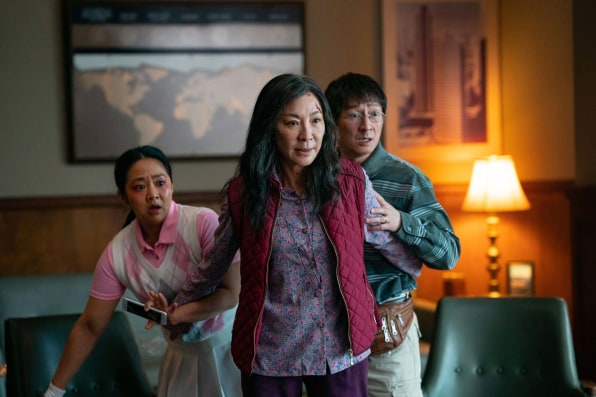
Weird science comes up a lot when the two describe their process, but fitting all the pieces together also required an approach that’s more like engineering. The script took a year and a half to refine, but once they started shooting, said Kwan, “we barely rewrote.” Later, alongside the phenomenal editing of Paul Rogers, they carefully fine-tuned the mood and rhythm and pandemonium, sometimes after showing rough cuts to friends and strangers. “But not too many people,” said Schienert, “so we wouldn’t get demoralized.”
Kwan pointed to a metaphor he’d heard Son Lux use when they were describing their own constructive approach: Rather than building a house and finding furniture for it, they find the furniture they like and build the house around it. “That is definitely how we work,” said Kwan. “We’re like, I know you’re supposed to build the house first, but look at this furniture! Look how these weird things that we love fit together.”
Breaking taboos
Among the many concepts they initially hoped to include, one idea stood out: In early drafts, the two had imagined Evelyn would face another quiet struggle, with undiagnosed ADHD. “It started as an almost insensitive idea, like, what if the main character was so distractible, they could tap into other universes?” Scheinert recalled. They began researching the condition on the internet, and Kwan dove in hard. At some point, he found the symptoms alarmingly familiar. “I just stayed up until four in the morning, just crying and just realizing, holy shit—I have it,” he said. “In case you can’t tell when you watch this movie.”
He called his eventual ADHD diagnosis transformative. “It really was this beautiful moment of opportunity for me to forgive myself for the first 25 years of my life. Because I didn’t know. . . . You have these feelings of ‘I’m worthless.’ ‘None of my friends can rely on me.’”
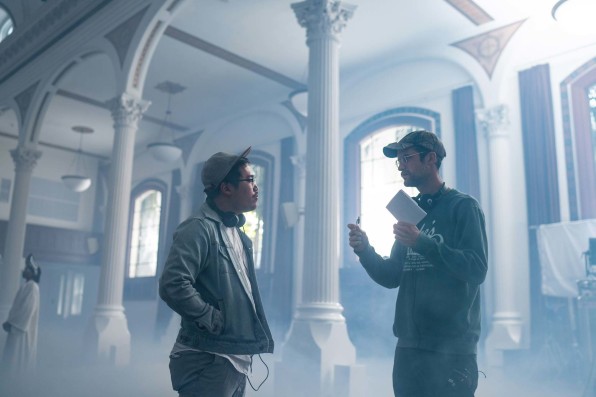
The self-loathing can open up more unhealthy pathways. Kwan cited a “mind -boggling statistic” he’d seen, that adults with undiagnosed ADHD have a 15-year-shorter lifespan. (Researchers have proposed various causes for lower life expectancies for people with ADHD.) “And a lot of it comes down to depression and suicide, which is very real,” he continued. “It’s the reason why this movie and Swiss Army Man [which features frank discussion about suicide] deal with those kinds of thoughts.”
Kwan is treating his ADHD with therapy and medication as needed, and trying to break a taboo by talking openly about it.
“What the diagnosis really does is, it removes you from that judgment so that you can understand yourself and forgive yourself,” said Kwan. “It’s like, now that I know this, how can I move forward?”
In another universe, Kwan doesn’t get his diagnosis. The Daniels choose to do the Marvel series. Or perhaps one of them moves to New York City after graduation and chooses not to do that summer camp, and they never get together to begin with. Or they do the movie, and go deep down the multiverse rabbit hole without really figuring out how to address the nihilism of the multiverse. It’s a fun action movie. I don’t write any of this.
In this universe, that isn’t what happens. In this one, the duo decide to take the absurd, chaotic meaninglessness of everything to its logical conclusion, and find something valuable there. “Later we realized, this is what a lot of our favorite art does,” said Scheinert. “It stares scarily close to the abyss, and then gives you something hopeful, in case that’s where you are.”


